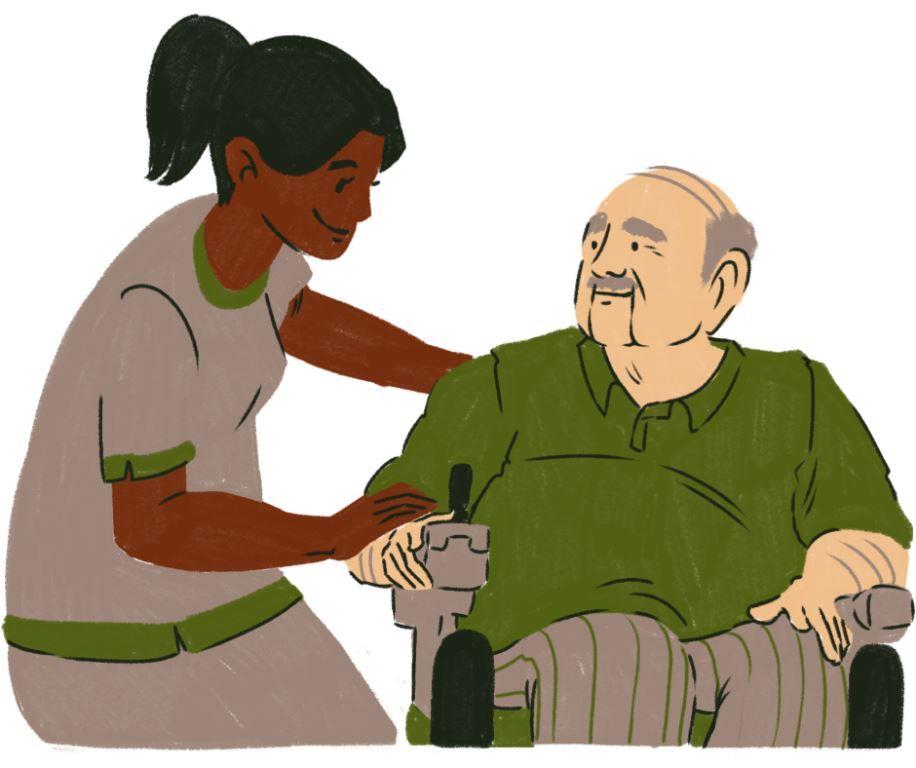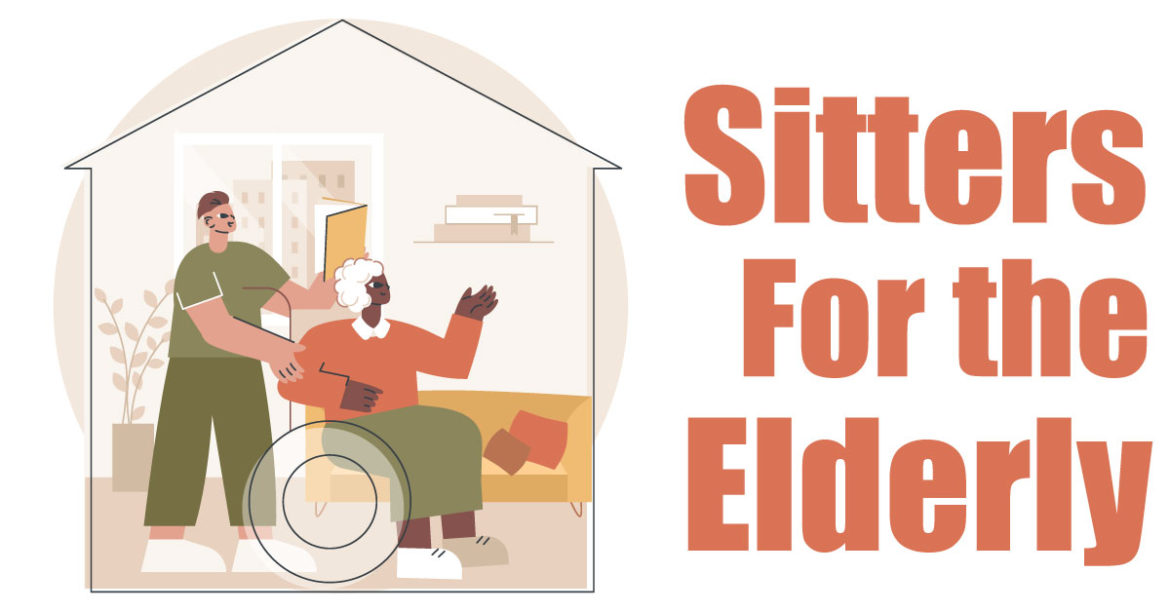Article Contents
As the population of the United States continues to age, the demand for quality caregivers is at an all-time high. Unfortunately, families are often stretched thin in terms of time and resources, making it difficult for them to provide the care that their loved ones need. This is where sitters for the elderly can step in and provide much-needed assistance.
Thankfully, there are many great sitters for the elderly available. These caregivers offer high-quality services and can provide families with reassurance and peace of mind. In this blog, we will explore the benefits and cons of having sitters for the elderly, how much they charge, and how you can hire the right person for your senior loved one. So, keep reading!
What Is a Sitter and What Services Do They Provide?
A senior sitter is a type of caregiver who provides companionship to an elderly individual. Generally, they provide non-medical assistance to seniors who live alone. In some cases, sitters run small errands as well as help with activities of daily living. Senior sitters can be an excellent option for seniors who need assistance but do not want to live in a nursing home or assisted living facility.
Here are the services typically provided by sitters:
- Offering companionship through chatting, reading, or other socializing activities
- Playing board games or preparing crafts
- Help with preparing meals
- Run small errands like grocery shopping or making doctor’s appointments
- Taking their clients out for a walk or doing light exercise
- Provide medication reminders

Sitters for the elderly
What is the difference between senior sitters and caregivers?
Senior sitters and caregivers both provide care and assistance to seniors, but there are some differences between the two roles:
1. Scope of services
Senior sitters:
Typically, they focus on providing companionship and supervision to seniors. They may engage in activities such as conversation, reading, playing games, or accompanying seniors on outings. Their fundamental role is to ensure the safety and well-being of the seniors during their absence or when additional support is needed.
Caregivers:
Provide a broader range of services. They not only offer companionship but also assist with activities of daily living (ADLs) and instrumental activities of daily living (IADLs). This can include tasks such as bathing, dressing, grooming, meal preparation, medication reminders, light housekeeping, transportation, and assistance with mobility.
2. Level of training and qualifications
Senior sitters:
Typically require less formal training and qualifications compared to caregivers. They may have experience in elder care or a background in companionship services. While it’s beneficial for senior sitters to have some knowledge of basic first aid and emergency response, they may not need extensive medical training.
Caregivers:
On the other hand, caregivers often undergo more comprehensive training. They may have certifications such as Certified Nursing Assistant (CNA) or Home Health Aide (HHA). Caregivers may receive specialized training in areas like medication management, dementia care, or hospice care, depending on the specific needs of the seniors they assist.
3. Responsibilities
Senior sitters:
They primarily focus on providing social interaction, emotional support, and supervision to seniors. They may help with mealtime companionship, engage in recreational activities, provide conversation, and monitor the senior’s safety.
Caregivers:
They have a wider range of responsibilities. In addition to companionship, they assist with various daily tasks to ensure the senior’s well-being. This can involve assisting with personal hygiene, administering medications, managing medical appointments, organizing and preparing meals, performing light housekeeping, and assisting with mobility and exercises.
5 Qualities of a Good Senior Sitter
Many qualities make a good in-home sitter for the elderly. Seniors can be challenging to care for and often require extra time and attention. So, let’s check out the top 5 qualities of a good senior sitter:
1. Calm and patient
A good sitter’s most important quality is being calm and patient. Seniors can often be forgetful or confused, especially if they have underlying conditions like dementia or Alzheimer’s disease. So, the sitter should be able to deal calmly with any situation.
2. Respectful and kind towards their client
The sitter should be compassionate, kind, and respectful towards their client’s wishes and preferences. They should be able to provide seniors with the attention and care that they need in order for them to feel comfortable and safe.
3. Able to handle difficult situations
A good senior sitter should have an alert mind and be able to handle difficult situations with grace. Also, in the event of an emergency, they should be able to think quickly and take the necessary action.
4. They are flexible
A good sitter is also flexible, able to adapt to changes in schedule or routine. It does not mean they will be at their client’s service 24/7, but in some emergency or unavoidable situations, they should be able to accommodate their needs.
5. Good communication skills
Good communication skills are a must for private sitters for the elderly, even more so if they are talking to or caring for dementia patients. A good sitter should be able to communicate effectively with their clients and their families. Effective communication also helps to keep a positive attitude.
What Are the Benefits of Sitters for the Elderly?
There are many benefits to having a sitter for the elderly. Some of these benefits include:
1. Ensure safety and security
Sitters can also help keep the elderly safe and secure, by checking in on them regularly, monitoring their health, and taking swift actions during an emergency. In addition, they provide peace of mind for the elderly person and their loved ones, knowing that someone is there to help if needed.
2. Provide socialization opportunities
Another great benefit of having a sitter is that it can provide social stimulation. The elderly can often feel isolated, especially if they don’t have many family members or friends nearby. It can help prevent loneliness and depression, ultimately improving their mental well-being.
3. Assistance with Activities of Daily Living
Home sitters for the elderly can also help the elderly person with activities of daily living such as cooking, dressing, and grooming. This can make it easier for the elderly person to stay independent and live at home.
4. Improve the quality of life
Having someone around to talk to or assist with tasks can help reduce stress levels for the elderly person. Also, sitters can provide a sense of continuity for the elderly, which can be comforting and reassuring. All of this can improve their quality of life for them.
Cons of Having Sitters for the Elderly
There are several potential cons of having sitters for the elderly. Some of them include the following:
1. They can be Expensive
Hiring a sitter for your elderly loved one can be expensive, especially if you need someone to stay with them full-time or require extra care.
2. Lack of training and experience
There is always a risk that the sitter will not be adequately qualified or experienced and could cause harm to the elderly person.
3. Cause potential harm
If the sitter is not correctly screened or background checked, they could potentially scam or harm the elderly person.
4. Create attachment issues
Sometimes the elderly person becomes attached to their sitter. So, it can be tough for them to adjust when the sitter is no longer available.
Cost of Hiring Sitters for the Elderly
The cost of hiring a sitter for the elderly can vary depending on a number of factors. For example, their experience and qualification, the level of care needed, location, service hours, etc. Generally, a sitter’s hourly rate can range between $10-$19 per hour, while the median rate of a senior sitter in 2022 is $14.87 per hour. However, this cost can go up if the sitter is required to provide more specialized care, such as 24-hour care or assistance with household tasks or medical needs.
In addition, many agencies charge a premium rate if you are looking for a last-minute fill-in. For example, if you need a last-minute fill-in on a Saturday night, you can expect to pay around $25 per hour.
How to Select Sitters for the Elderly?
Finding the right sitter for your loved one is essential, whether it’s a short-term respite from caregiving or full-time assistance. Here are some tips to help you select the right person for the job:
1. Determine the type of care needed
First, consider what type of care your elderly loved one needs. For example, some sitters can only provide basic companionship and home safety checks, while others can provide more intensive care such as personal grooming, bathing, and medication management.
2. Research local providers
Next, research local providers. Ask friends and family for recommendations, or search online for reviews. Make sure to read the Make sure to read the specifications before signing any contracts, and be sure to ask about insurance coverage and liability.
3. Meet potential sitters in person
Take the time to meet with potential sitters in person. Ask them about their experience caring for seniors, what kind of training do they have, their availability, and their rates. Be sure to also ask about their policy on overtime and whether they’re comfortable working with specific medical equipment or medications.
4. Do a reference check
While looking for a sitter, you should also ask for references from past clients. It is crucial to speak with those clients to get an idea of the sitter’s quality of care. Otherwise, it may affect future interactions between parties involved in caretaking arrangements.
5. Do a background check
Finally, you should always do a background check on any potential sitters. There have been many instances of elder abuse in the hands of their caregivers, so a proper background check is vital. It can help ensure that they have no criminal history and are not currently facing any legal charges.
Final Thoughts
While there are some pros and cons to having a professional sitter for your elderly parent or grandparent, it is ultimately up to you and your loved one to make the decision that you believe is best.
If you decide that a professional sitter is right for your loved one, be sure to do your research. Check their experience, backgrounds, cost, and overall demeanor so that you can find a qualified and trustworthy individual for your senior loved one.
We hope this article has helped to give you a better understanding of what hiring a sitter for the elderly entails. If you have any other queries, please do not hesitate to reach out to us. In the meantime, you may also check some of our related articles:
- How to Become a Caregiver: Step-by-Step Guide
- Live-In Caregiver: 8 Misconceptions and Truths
- Legal Issues for Caregivers: Common Ones They May Face
- Mental Health in Elderly: How to Improve It?
FAQs
Does Medicare cover sitters for the elderly?
Medicare usually covers the cost of caregivers if they assist with medical needs. Since sitters typically provide non-medical care, Medicare will not cover their costs.
How much do sitters for the elderly make per hour?
In general, a senior sitter’s hourly rate is around $10-$19 per hour, while the average rate of a senior sitter in 2022 is $14.87 per hour. However, this cost can go up if the sitter is required to provide more advanced care.

